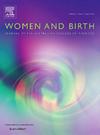Understanding preconception health in Australia through the lens of people of reproductive age: Implications for care providers
IF 4.4
2区 医学
Q1 NURSING
引用次数: 0
Abstract
Problem
Limited awareness about the importance of preconception health is a recognised barrier to preparing for pregnancy.
Background
Opportunities exist to improve the health of future parents through preconception care. One of the recognised barriers to pregnancy preparation is a lack of knowledge and a lack of presentation for information and care.
Aim
To explore the understanding of “preconception health” amongst people of reproductive age in Australia to inform the delivery of preconception care.
Methods
A qualitative descriptive study using online interviews with people of reproductive age in Australia. Recruitment was via social media (Facebook). Interview transcripts were analysed thematically.
Findings
Of the 20 women and five men we interviewed, all acknowledged the importance of preparing for pregnancy. Despite broadly understanding the concept, most participants had limited understanding of the details of preconception health. To increase their knowledge, participants’ preferred sources of information included education in schools, reputable online sources, primary and maternity healthcare providers, and community members with lived experience.
Discussion
People in Australia are keen to learn about preparing for pregnancy and appreciate this as important. Suggested avenues to improve awareness and understanding about optimal preconception health included through school education, primary and reproductive healthcare providers, and online resources. This can improve understanding and behaviours before first and subsequent pregnancies.
Conclusion
Preconception care requires a life-course approach, beginning with universal education through schools, enhanced by readily accessible reputable online resources, and access to trusted primary and maternity care providers. Maternity care providers can be key drivers in this process.
从育龄人群的角度了解澳大利亚的孕前健康:对护理提供者的影响。
问题:对孕前健康的重要性认识有限是公认的孕前准备障碍。背景:存在通过孕前护理改善未来父母健康的机会。公认的孕前准备障碍之一是缺乏知识和缺乏信息和护理的介绍。目的:探讨澳大利亚育龄人口对“孕前保健”的理解,为孕前保健的提供提供信息。方法:对澳大利亚育龄人群进行在线访谈,进行定性描述性研究。招聘是通过社交媒体(Facebook)进行的。访谈记录按主题进行分析。调查结果:在我们采访的20名女性和5名男性中,所有人都承认为怀孕做准备的重要性。尽管广泛了解这一概念,但大多数参与者对孕前健康的细节了解有限。为了增加他们的知识,参与者首选的信息来源包括学校教育、信誉良好的在线资源、初级和产妇保健提供者以及有实际经验的社区成员。讨论:澳大利亚人热衷于学习如何为怀孕做准备,并认为这很重要。建议通过学校教育、初级保健和生殖保健提供者以及在线资源提高对最佳孕前保健的认识和理解。这可以提高初次怀孕和随后怀孕前的认识和行为。结论:孕前保健需要一种贯穿整个生命周期的方法,从学校普及教育开始,通过易于获得的信誉良好的在线资源和可信赖的初级和产科保健提供者来加强。产妇保健提供者可以成为这一进程的关键驱动因素。
本文章由计算机程序翻译,如有差异,请以英文原文为准。
求助全文
约1分钟内获得全文
求助全文
来源期刊

Women and Birth
NURSING-OBSTETRICS & GYNECOLOGY
CiteScore
7.20
自引率
13.20%
发文量
371
审稿时长
27 days
期刊介绍:
Women and Birth is the official journal of the Australian College of Midwives (ACM). It is a midwifery journal that publishes on all matters that affect women and birth, from pre-conceptual counselling, through pregnancy, birth, and the first six weeks postnatal. All papers accepted will draw from and contribute to the relevant contemporary research, policy and/or theoretical literature. We seek research papers, quality assurances papers (with ethical approval) discussion papers, clinical practice papers, case studies and original literature reviews.
Our women-centred focus is inclusive of the family, fetus and newborn, both well and sick, and covers both healthy and complex pregnancies and births. The journal seeks papers that take a woman-centred focus on maternity services, epidemiology, primary health care, reproductive psycho/physiology, midwifery practice, theory, research, education, management and leadership. We also seek relevant papers on maternal mental health and neonatal well-being, natural and complementary therapies, local, national and international policy, management, politics, economics and societal and cultural issues as they affect childbearing women and their families. Topics may include, where appropriate, neonatal care, child and family health, women’s health, related to pregnancy, birth and the postpartum, including lactation. Interprofessional papers relevant to midwifery are welcome. Articles are double blind peer-reviewed, primarily by experts in the field of the submitted work.
 求助内容:
求助内容: 应助结果提醒方式:
应助结果提醒方式:


